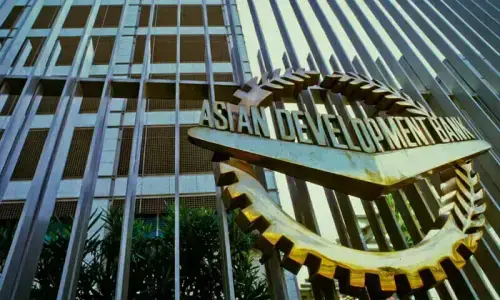On the last day of 2022, more than 30,000 male and female applicants from across Pakistan flocked to the capital in order to appear for a written test for the job of a constable (BS-07) in the Islamabad police force. The stadium at which the test was held was packed to the brim, filled as if a football match was about to commence. However, there were only 1,667 vacant positions.
Seats for this post are allocated on open merit and the regional quota is further subdivided for women and minorities. All the candidates had to have completed their matric and had to pass an endurance test, after which the shortlisted candidates were called for the written test.
The reality is that the number of people who turned up for the written test would have been a lot higher if there were no physical criteria which had to be met. This episode is an alarming and depressing reminder of the limited opportunities that are available to the formally educated youth of Pakistan and serves as a microcosm of the issues they are facing.
Much has been written in the media by leading economists, former finance ministers and State Bank governors about the macroeconomic challenges Pakistan is currently confronting. However, the issue of employment generation and job creation has often been overlooked, or simply avoided, since we are grappling with the larger and more immediate questions about debt repayment, the boom-and-bust cycle and the country’s precarious flirtation with default.
Although Pakistan is facing many challenges on the economic front, youth unemployment might be one of the most dangerous ones. Not only does it compound the country’s macroeconomic issues but it also leads to the much dreaded ‘brain drain’
Ultimately, only the private sector can offer a sustainable solution to job creation in Pakistan. Hence, it is imperative that the public sector and spheres of governance ensure that a suitable environment is created for business, in which the private sector can grow and thrive.
But there are certain infrastructural and regulatory obstacles that keep the private sector from growing in the country and thus leave a large chunk of Pakistan’s educated youth unemployed.
Power outages, a lack of investment in research and development and a volatile political situation are some of the factors which have limited the employment opportunities that are created for Pakistan’s youth. Another major employment challenge facing Pakistan is that a large portion of the labour force earn extremely low incomes and often work in hazardous and poor working conditions.
Perhaps one of the main reasons why youth unemployment is a burden which Pakistan has to bear is the skills mismatch prevalent amongst 18-25-year-olds in the country. A large number of the youth lack access to quality education and dissemination of skills required to attain and maintain jobs in a very competitive market. Combining formal education with on-the-job training can significantly facilitate these young graduates and the state must take the help of the private sector in designing a systematic curriculum which increases the employability of these individuals.
Women and trans-people face specific hindrances in the job market. For example, many cultural and legal provisions disadvantage these groups in terms of owning property or starting a business. The government has however introduced certain tax measures in an attempt to rectify these shortcomings.
For example, clause (19) of the Second Schedule to the Income Tax Ordinance, 2001 (ITO 2001), through the Finance Act 2021, provides that the tax payable by women enterprises on profit and gains derived from their business must be reduced by 25 percent. However, such an enterprise must be a start-up established on or after July 1, 2021. Furthermore, to avail the benefits under this clause, it must not be formed by a transfer or reconstruction of an existing business.
Besides lenient tax measures, women entrepreneurs must be facilitated by providing them with easier access to finances and by increasing their awareness and knowledge about how they can start their own enterprises through training and advisory services. Encouraging entrepreneurship at a national level is one of the ways the state can attempt to manage joblessness. Systematically supporting the entrepreneurial activities of students and graduates will not only help them create jobs for themselves but for others as well.
Sixty-four percent of the country’s population is under the age of 30. There is a pronounced youth bulge which, if it is not catered to, will lead to severe consequences for the state, society and the economy, thus further compounding the hopelessness, despair and destitution already plaguing the country.
The Labour Force Survey (LFS) published by the Pakistan Bureau of Statistics (PBS) in 2021 showed an uptick in unemployment, with the educated youth more likely to face difficulties in finding jobs. One of the factors behind this trend is underemployment, i.e. people with good education and skills forced to take low-paying jobs due to an unavailability of jobs matching their skillset and education. This is reflected in the high number of applications received for positions like the ones offered by the Islamabad police force.
The government has enough data to map and identify existing gaps in order to create human capital which addresses these shortfalls. A study titled ‘Pakistan’s Opportunity To Excel: Now and The Future’ by Dr Nadeemul Haq, Vice Chancellor of the Pakistan Institute of Development Economics (PIDE) and Dr Durre Nayab, Director PIDE, conducted an in-depth examination of the Labour Force Survey. It revealed that the unemployment rate among university graduates in Pakistan is a whopping 31.2 percent.
An increase in demand for higher education, combined with a lack of job opportunities, has significantly contributed to the high unemployment rate. This, therefore indicates, a missing link between educational institutions and the labour market.
Against this backdrop, it is unsurprising that Pakistan has been facing a rampant brain drain. Our doctors, engineers, Information Technology (IT) experts and educationists are forced to move out in search of greener pastures. Many of them have already left the country or are planning to do so. These are the people with special skills who have become frustrated with the lack of job opportunities and improper remunerations offered to them in Pakistan. They are distrustful of the government, the political leadership and the prevalent economic and social system as a whole.
According to the International Monetary Fund (IMF), the migration rate from Pakistan of individuals with a tertiary education to the OECD countries is more than 7 percent, while for India it is 2.7 percent. An important implication of the brain drain is that investing in education in our country may not lead to faster economic growth if a large number of the highly educated people we produce eventually leave the country.
Additionally, efforts to reduce specific skill shortages through improved educational opportunities may be largely futile unless measures are taken to offset existing incentives for highly educated people to emigrate.
Ultimately, the government must do more than handing out limited ‘nonfunctional’ posts and pursuing short-sighted and politically motivated endeavours like the Kamyab Jawan programme. If the issue of unemployment among the educated youth is not addressed, it will continue to feed into social unrest, mental health issues and even terrorist activities in the country.
The writer is a lecturer at the National University of Modern Languages, Islamabad.
He tweets @Sohail_QAU
Published in Dawn, EOS, January 22nd, 2023

































